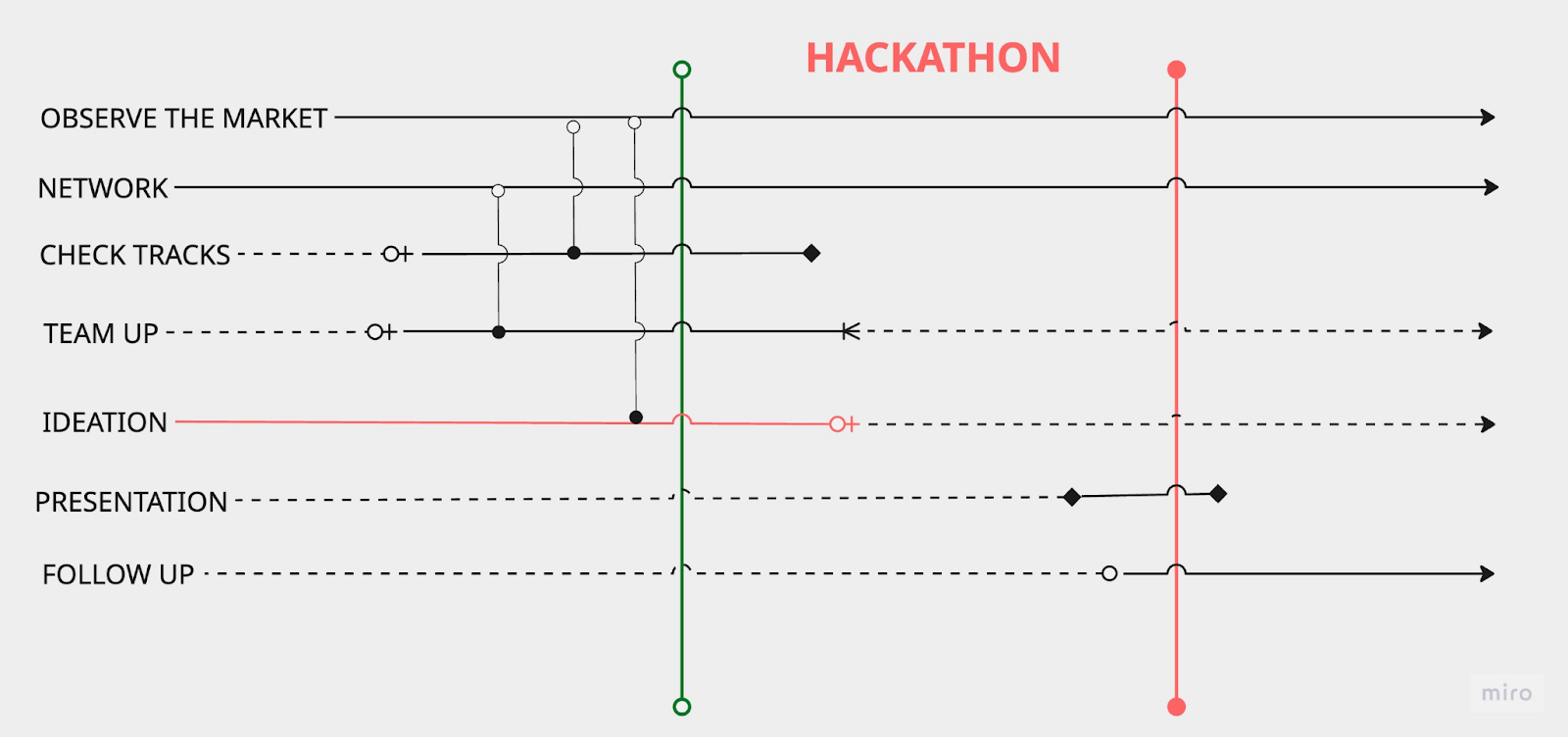作者:Yilmaz, Citrea DevRel(开发者关系)
编译:Felix, PANews
近年来,Web3 黑客松逐渐在全球兴起,成为业内的开发者盛会。一群来自全球各地的开发人员在活动期间头脑风暴,组建紧密合作的小组,创建出功能正常的应用,以期能获得大奖。但成功者总是少数,除了技术本身外,如何能在大赛中拔得头筹,或许是每个开发者的疑问。ETHGlobal Taipei 2025 黑客松的评委 Yilmaz 近日发文,对参赛者如何能在黑客松中脱颖而出,提出了自己的建议。以下为内容全文。
你跨越半个地球去参加一场黑客松。你的代码干净简洁,简直让人忍不住想舔屏。然而,你却空手而归,没有拿到任何奖品。这是怎么回事?提示:这不是技术问题。
这种情况屡见不鲜。优秀的开发者、出色的构建者一无所获。这并不是因为他们技术不好,而是因为他们忽略了黑客松的某些关键环节。
最近,我代表 Citrea 在 ETH Global 台北站担任评委。Citrea 赞助了这次活动,并举办了“Citrea 上最佳 Bapp”和“实验性 DeFi Bapps”等评选活动。在活动的大部分时间里,我不仅负责评委,还在观察——在展位、桌位之间穿梭,聆听开发者的想法,并一起头脑风暴。看到这些场景让我想起自己参加竞赛的日子,那时我便学会了如何拆解游戏规则,从而有可能赢得奖励。
这篇文章将分享一些如何真正“攻克”黑客松的见解——来自一位曾作为架构师,如今作为开发者关系(DevRel),评审过多次 Web3 黑客松的人的经验。

黑客松在开赛日前就已经开始
认为黑客马拉松从第一天才开始,这是最大的错误之一。其实并非如此。我并不是说要预先构建好你的项目(那样会被立刻取消资格),但有很多事情你可以提前准备。
观察
你可能是一名学生,也可能是一位经验丰富的开发者,想要涉足 Web3 生态。但你知道自己要涉足哪个领域吗?你应该尽早观察这个行业。不是在推特上闲聊,而是真正深入研究这个领域,看看大家都在做什么。有哪些薄弱或空白的地方是你能够填补或改进的,哪些是即将出现的改进,哪些项目在哪些赛道中表现强劲。
对你要涉足的领域有一个整体的了解会非常有帮助。如此说是因为看到很多开发者试图从他们几乎一无所知的领域中获得奖励。这在大多数情况下是行不通的,因为你根本不知道自己要构建什么。评委、黑客和顾问在黑客松期间可能会提供一定帮助,但还远远不够。
建立人脉与团队合作
如果你没有团队就踏入赛场,那你就已经落后了。在黑客松开始前,你还有几天甚至几周的时间来组建团队——这给了你时间去筛选成员、测试团队成员的兼容性、提升团队协作能力,或者调整团队成员的角色。
不过,独身参赛并非毫无希望。也许你有意在现场组建团队,与背景各异的人一起头脑风暴,激发独特的创意。如果你还没有团队,那就积极主动些:在黑客松开始前参加一些周边活动、鸡尾酒会和主题演讲。与开发人员、设计师、产品经理、开发者关系人员,甚至商务拓展人员交流。他们可能不懂编程,但他们认识很多人,能帮你找到完美的队友。
个人在台北以太坊黑客松前就帮助组建了两支队伍。他们之前并不认识,但其中一支队伍最终还获奖了。
尽早查看赛道
在黑客松开赛的首日前,尽早查看赛道和提供资助的项目。令人惊讶的是,很多参赛者直到活动开始才关注这一点。赛道通常会提前几天或几周公布,让参赛者有时间制定策略。
例如,ETH Global 黑客松开赛前两周就公布了赛道。一些开发者会提前联系项目方,阐述想法并确保与赛道保持一致。这种积极主动的方式使他们能够调整想法或选择合适的赛道,从而最大限度地提高获胜机会。
打破常规
创意至关重要。即使你拥有最简洁的代码库,仍然可能失败。为什么?因为你的创意不够突出。它没有达到产品市场契合度,或者评审团已经见过太多类似的产品。如果你提交的又是一个 AI 钱包界面,而且与过去两个月里六个团队提交的作品相比几乎没有改进,那你毫无希望。由于评委在第一阶段就对你的创意/概念没有兴趣,所以很难吸引评委去关注你的代码。
评委对每份提交作品的评选时间有限,无法深入研究每一行代码。因此,产品概念或创意至关重要。这个概念是否合理?它是否独特,或者对市场上的现有产品有真正的改进?它是否让人感觉新颖?
举一个真实的案例。在台北以太坊黑客松上有一只来自菲律宾的团队。他们拥有 Web2 背景,完全没有 Web3 经验,但他们的创意完全打破常规,新颖的创意立刻吸引了评委的注意。他们甚至没有提交到我们的赛道,但现在正在我们的孵化项目 Citrea Origins 中与他们合作。这就是一个出色创意的力量,能立即获得关注。
站在评审团的角度思考。两天下来,评审团看了二十多个项目已经疲惫不堪。你只有几分钟的时间来赢得评委青睐。
脑中的思考清单如下:
这是什么产品?
这个概念是否新颖?
它是否有潜在的产品市场契合度?
这是否只是其他产品的复制?
这是在本次黑客松期间编码的,还是预先构建的/反复提交的?
评委们什么都见过。如果你的项目只是空有其表,很快会被识别。

Talip(Citrea DevRel )一眼就能识别预建项目
与评审团互动
想提高胜算吗?不妨和评审团交流一下,他们能提供的帮助远超你的想象。在开始构建之前,阐述你的创意,与评委探讨一番。
这不仅能完善你的想法,还能提升关注度。如果评委见过你的脸,听过你的方案,然后在提交的作品中再次看到你的项目——就会记住你。那么你自然具有优势。
引人注目
确保你的作品引人注目。一旦有了绝佳的创意和坚实的团队,就着手打造——但别止步于此。你或许有能脱颖而出的想法,但要确保获奖,还得好好展示。很多时候,参赛者会忽略演示环节,只是发个 GitBook,这或许也能行得通。不是说你得做丰富多彩的演示,而且应该有一个条理清晰、解释详尽的演示。
给它起个好名字——没错,名字很重要。它能定下基调。
设计架构——绘制图表,简化说明。
创建可点击的演示——比视频更有力,让评委们亲身感受。
构建简洁清晰的 PPT——你的幻灯片应该能够解释所有内容,无需你过多讲解。
除非绝对必要,否则不要在视频演示上投入太多精力。如果只是五分钟的用户界面展示,评委可没兴趣。提供一些互动内容。让评委感受一下这个应用,体验一下。
我的一位建筑学教授曾说过:“如果我需要提问,那说明你的演示失败了。”这听起来可能有点极端,但请将其作为演示的指导方针。因为从更广泛的角度来看,你的演示本质上就是你的 Pitch Platform。

等等,一切都是为了吸引注意力?一直都是
不止是奖金
最后,请记住:奖金固然不错,但它们并非真正的奖品。
黑客松是一种注意力经济。所有人都在关注。即使你没有获胜,也能给合适的人留下深刻印象,机会之门就会为你敞开:孵化机会、合作伙伴关系,工作机会。奖金是短期的;而你的声誉是长期的。
还有,请不要为了凑数而参加五个名不见经传的黑客松,没人会在意。打造一些能让你成长的东西,让每场黑客松都为您的作品集增添价值。
简而言之,如何参与黑客松:
尽早组队
构思新颖的想法
站在评审团角度思考,多互动
制作一个可点击的、精美的演示
像你的未来取决于它一样推销它(因为确实如此)
相关阅读:Electric Capital年度开发者报告:3.9万新开发者加入,超过一半以太坊开发者致力于L2
免责声明:本文章仅代表作者个人观点,不代表本平台的立场和观点。本文章仅供信息分享,不构成对任何人的任何投资建议。用户与作者之间的任何争议,与本平台无关。如网页中刊载的文章或图片涉及侵权,请提供相关的权利证明和身份证明发送邮件到support@aicoin.com,本平台相关工作人员将会进行核查。



